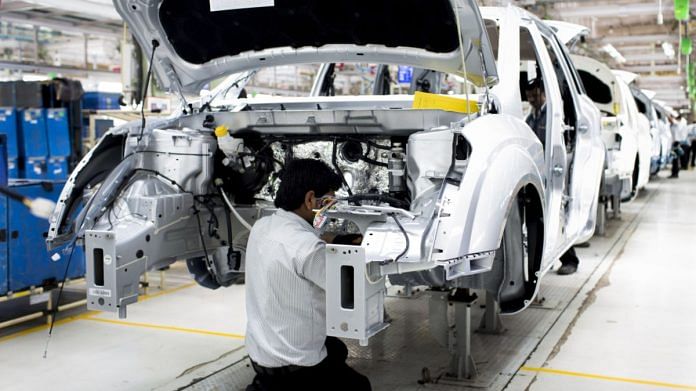The Indian auto sector seems to be on a fast track to fame, literally. While all headlines focus on Ford’s India exit, the Union cabinet’s approval of the Production Linked Incentives scheme will help speed up the post-Covid economic recovery process. The Narendra Modi government’s efforts to bail the sluggish economy out of the current situation comes close to the announcement of setting up the National Monetisation Pipeline as a Special Purpose Vehicle through which brownfield infrastructure assets will be monetised.
The PLI scheme for the automobile industry had initially promised to provide an outlay of about Rs 57,000 crore but now stands reduced to Rs 26,000 crore, almost a 50 per cent cut. The scheme, along with the Rs 18,000 crore Advanced Chemistry Cell and Rs 10,000 crore Faster Adaption of Manufacturing of Electric Vehicles (FAME) programme, will help India produce more electronic vehicles and go green. The good news is that the existing auto manufacturers as well the new ones who wish to enter the sector can participate in the PLI scheme equally.
Along with the auto sector, telecom is another important sector that should heave a sigh of relief. The Union cabinet has announced a series of structural and procedural reforms in the telecom sector with a long list of expectations.
All these reforms, packages and course corrections are expected to increase production, encourage investments and, more importantly, address the issue of employment opportunities. With elections to important states around the corner, the promise of jobs assumes great significance.
Also read: Maruti Suzuki says output to drop 40% in September due to chip shortage
Why telecom and automobile push matters
Interestingly, the telecom sector deserves better treatment considering the role it played during the pandemic lockdown and the economic slowdown. The online assistance to patients, work from home, online supply chain of essential commodities and, above all, the social media connect in times of ‘social distancing’ were all possible only due to the effective functioning of this sector.
The telecom industry has much greater potential to reach out to a wider consumer base. But the current regulatory framework needs to hit the refresh button. There is scope for increased Foreign Direct Investment (FDI) in this sector. The structural reforms seek to address this area by allowing hundred per cent FDI under automatic route in the telecom sector. Rationalisation of revenue calculation—by excluding non-telecom revenue from the Adjusted Gross Revenue (AGR) definition—and interest rates, removal of penalties, interest on penalties, Spectrum Usage Charge (SUC) and relaxation in Bank Guarantee (BG) provisions are some of the bold steps initiated by the Modi government in the telecom sector.
These reforms by themselves will not result in a turnaround of the economy unless the sectors, both telecom and automobile, integrate their working methodologies and improve innovation. The auto sector took the major share of the pandemic linked setback and drop in sales. As many as six major automobile manufacturers have quit India, the fifth-largest auto industry arena in the world.
The immediate effect of this would be seen in the auto component sector, which provides employment to millions through manufacturing, trade, investment and sales opportunities. How deep the reform process will percolate to revive the industry and bring it back to the days of its glorious past is unclear as of now.
Also read: India firmly committed to move forward with goal of clean and modern mobility, PM Modi says
No development happens in isolation
Meanwhile, both the telecom and auto industry are greatly dependent on the research and development of innovative products and processes in the Artificial Intelligence (AI) industry, which unfortunately remains one of the neglected sectors. Innovation in AI requires massive technology innovation, transfer and financial investments from the government and quasi-government agencies. The role of Higher Educational Institutions (HEI), both in public and private sector, is important in the creation of robust futuristic technology and skilled workforce. The government-industry-institution interface is in a woeful condition currently, to say the least.
Yet another area that is related to the recent reform process and industries is the utilisation of Outer Space. Besides the Indian Space Research Organisation (ISRO) and Antrix Corporation Limited, the government has taken initiative in forming New Space India Ltd (NSIL) and the Indian National Space Promotion and Authorisation Centre (IN-SPACe). Together, they are expected to facilitate the entry of private sector in the domains of building and launching satellites for commercial purposes. This entire exercise requires much greater concentration, devoted teamwork and regular appraisal for policy changes, course correction and optimum output.
Economic revival is closely linked to investments, innovation and institution of ideal climate for the industry to develop. Ease of business, industrial output and economic reforms should not remain shackled to constantly changing political process, rigid bureaucracy, administrative red-tapism or vagaries of electoral prospects. The challenges of the pandemic also come with ample opportunities. The industry, business community as well as consumers expect the government to choose speedy reforms over speed breakers. It is for a dynamic government to grab the opportunities and realise the dream of $5 trillion economy.
Seshadri Chari is the former editor of ‘Organiser’. Views are personal.
(Edited by Neera Majumdar)



